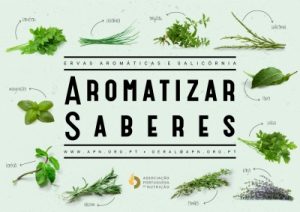Book ``Gastronomic use of halophiytes plants``

The book Gastronomic Use of Halophytes Plants is the result of the XtremeGourmet research project, and its purpose is to contribute to the careful expansion of the culinary use of halophyte plants.
The panel of collaborators to investigate the gastronomic use of these marine vegetables included the most prestigious Portugal Chef´s, with a common denominator: the passion for cooking, and in particular, the use of products linked to the sea.
Use, test, appreciate, and enjoy the wonderful salty vegetable experience!
XtremeGourmet 2.0

XtremeGourmet 2.0 Project
Gastronomy and healthy eating with halophytic plants
Aims to optimise the cultivation and nutritional value of halophytic plants, reducing their sodium content and exploring new species.
It includes research into their nutritional value, bioaccessibility and antioxidant and anti-inflammatory properties.
It seeks to extend the production period, post-harvest life and optimise sensory quality for greater acceptance.
It also has a strong component of dissemination and exploitation of results, with a view to promoting the consumption of these plants as healthy alternatives to salt and strengthening their presence in the gastronomic market.
XtremeGourmet

XtremeGourmet Project
Extremophile Plants in Gourmet Cuisine
Salicornia is a plant that grows in salt marshes and has recently been incorporated into gourmet cuisine. As they grow in areas with a strong marine influence, these plants are naturally subject to environmental pressures that lead them to produce antioxidant compounds, such as polyphenolics and vitamins A and E, which are highly valued for their nutritional and functional value, i.e. they can bring additional benefits to our health.
e-Book ``Aromatising Knowledge: Aromatic Herbs and Glasswort``

The Portuguese Nutrition Association (APN) has launched the e-Book “Aromatizar Saberes: Ervas Aromáticas e Salicórnia”. Miguel Salazar from Riafresh had the pleasure of participating in the review. The e-book contains recommendations on how you can benefit from consuming these plants, maintaining a healthy diet without sacrificing flavour. Aromatic herbs and Salicornia have been familiar and known since ancient times and have both medicinal and aromatic characteristics due to their properties.
Helena Real, secretary-general of APN, points out that “nowadays, eating healthily doesn’t mean eating food without flavour”. “Aromatic herbs and glasswort play an important role in this. Small steps during the preparation of our dishes can make a difference and turn a meal into a real experience of flavours. Adding a little oregano to fresh cheese, a little coriander to a fish dish, chives to a soup or salicornia to a salad are just a few examples of how easy it is to add aromatic herbs to your diet. Since the Portuguese consume more salt than they should, aromatic herbs and glasswort are beneficial for reducing salt intake.”
“LESSsalt- Looking for Efficient Salt Substitutes”
iBET – Instituto de Biologia Experimental e Tecnológica. Food Functionality & Bioactives Lab. Food and Health Division.
Development of Sustainable Packages from Agro-Industrial waste (e.g., Salicornia ramosissima Byproduct) Suitable for High-Pressure Process.
MED-Mediterranean Institute for Agriculture, Environment and Development. University of Algarve.
ECOSAL – Potential application of Salicornia ramosissima as cosmetic, nutraceutical and pharmaceutical ingrediente.
ISEP-Instituto Superior de Engenharia do Porto. Grupo de Reações e Analises Químicas.
RhizoMiS: Manipulation of the microbiome of the Salicornia rhizosphere to exploit bioproducts and improve bioprocesses.
Universidade de Aveiro. Universidade Lisboa. Universidade do Algarve.
Inquérito Pós-Degustação de Salicórnia Riafresh
Taste tests of Riafresh’s Salicornia carried out as part of the Integrated Master’s Degree in Medicine at the University of the Algarve, indicate a high intention to use Riafresh’s Salicornia as an alternative to salt, and as part of a balanced diet.
From the post-tasting survey of Riafresh Salicornia, the following results stand out:
– 98% of respondents would use Riafresh vegetables as part of a balanced diet;
– 82 per cent of respondents would often or always use Riafresh vegetables as an alternative to sea salt;
– 93% of respondents were very or quite satisfied with the savoury taste they experienced with Riafresh vegetables




